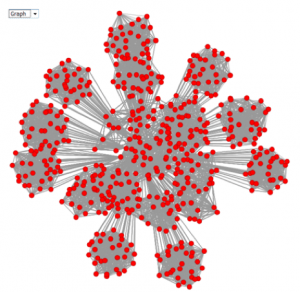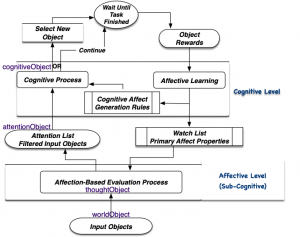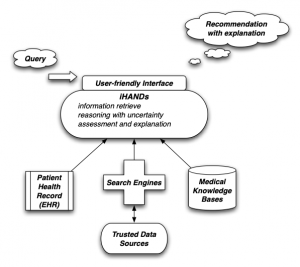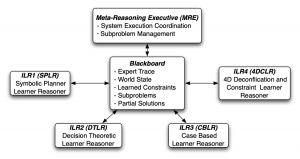Research
My primary research interest areas are intelligent agent technologies and multi-agent systems, with potential application domains such as social networks, health informatics, virtual organizations, and supply chains. My research work is aiming to contribute to the following missions:
1. Achieve a better understanding of intelligence in a social context;
2. Make multi-agent systems a practical programming paradigm for various applications, which contain distributed data, resources and control, therefore requiring both intelligent components and intelligent interactions among components.
Selected projects are introduced below.
Combat Information Overload Problem in Social Networks
We studied information-sharing in social network using agent-technologies. Social Networks have become popular and powerful platforms for people to share information. However, sharing information costs both computational and communicational resources, in addition to personal time/attention of both the senders and the receivers. Decision-making regarding which piece of information should be shared with whom, is important to both individuals and as well to the whole network. We developed an automatic decision-making mechanism to help each individual effectively and efficiently share information in a social network. We defined a matrix to evaluate information sharing strategies and studied the effects of different information-sharing strategies using a social network simulator. These socially-aware intelligent mechanisms are very helpful to solve the over-exposure, excessive consumption, information anxiety and information overload problems in social media.

Figure 1. A network consists of 27 small clusters (size 10), 6 medium clusters (size 33), and 2 large clusters (size 57), generated by a simulator for this study [Zhang, Zhang & Kaparthi, 2020 IEEE Trans].
Develop Hybrid Intelligence Mechanisms
AI researchers have always been perplexed by the role of affection (emotions) in intelligent machines. Some believe that emotion hinders problem-solving capability while the others stated that machines cannot be intelligent without emotion. In this project, we build a novel affective agent architecture with an affective (sub-cognitive) level that preprocesses the large amount input date using affective filter and a cognitive level that processes selected data and also learns to adjust the attention threshold in the affective level. Experiment results showed that the affect-based filtering mechanism is effective in decreasing the deliberation time without compromising the agent’s performance score. This study not only strengthens the premise that affect plays an important role in intelligent behavior but also presents a concrete agent architecture to combine affection and learning together to efficiently solve problems with large amount real-time data input. UMassD Master student Jason B. Williams developed his Master Thesis based on this project.
Support Health Care with Intelligent Agent Technology
Health care is a domain that would benefit tremendously from intelligent agent technologies. The first project in this work is to help general users, who have no medical training, to utilize their online health-related information to answer their health-related questions. We built an intelligent health and decision support agent (iHANDs) with various artificial intelligence mechanisms. iHands conducts both web search and local medical knowledge database search, utilizing the user’s electronic health records (EHR) to direct the search process. An information-fusion algorithm is developed based on Dempster-Shafer theory to merge the information from various sources with different reliabilities and generate the strength of support for each possible cause. A dynamic reference network is created and updated to record all information obtained during the interleaved search and reasoning process. The preliminary experiment results show the promise of iHands in assisting individuals in their healthcare decision-making process. The main contribution of this work is to demonstrate the potential of intelligent agent technology in helping users in a very important application area: health care. Perhaps the most innovative component is the development of this technology for a user group that is rapidly growing and more adept at using this technology, older adults with chronic illness. This project was done in collaboration with Prof. Kristen Sethares (Department of Nursing, UMass Dartmouth).
Generalized Integrated Learning Architecture
that is able to handle multiple tasks, learn from limited amount available data, decide when to stop deliberation and to start act, choose which input data to pay attention to, determine when to continue working on a task and when to decommit from an unachieved goal. The integration of different AI techniques is required to provide these capabilities. In Generalized Integrated Learning Architecture (GILA) project, we developed an ensemble architecture for learning problem-solving techniques from a very small number of expert solutions and demonstrate its effectiveness in a complex real-world domain. A set of heterogeneous independent learning and reasoning (ILR) components are coordinated by a central meta-reasoning executive (MRE) during learning and performance phases. This work shows the potential of multi-agent system as a unifying tool to ensemble various AI techniques for complex learning and problem solving. The architecture developed in this project is novel and applicable to many other problem domains where big data is not available. This project was supported by DAPRA/IPTO (Defense Advanced Research Projects Agency / Information Processing Technology Office).
References
S. Zhang, X. Zhang and P. Kaparthi, Combat Information Overload Problem in Social Networks With Intelligent Information-Sharing and Response Mechanisms, in IEEE Transactions on Computational Social Systems, vol. 7, no. 4, pp. 924-939, Aug. 2020.
Jason B. Williams and Xiaoqin Zhang. Combining affective intelligence with learning to improve action selection in decision-making agents. International Journal of Hybrid Intelligent Systems, 15(1):27–53, April 2019.
Brett Hannan, Xiaoqin Zhang, Kristen Sethares, iHands: Intelligent Health Advising and Decision-Support Agent, the 2014 IEEE/WIC/ACM International Conference on Intelligent Agent Technology (IAT 2014). Proceedings. Pages 294-301. August 11-14, 2014, Warsaw, Poland.
Xiaoqin Shelley Zhang, Sungwook Yoon, Phillip DiBona, Darren Scott Appling, Li Ding, Janardhan Rao Doppa, Derek Green, Jinhong K. Guo, Ugur Kuter, Geoff Levine, Reid L. MacTavish, Daniel McFarlane, James R Michaelis, Hala Mostafa, Santiago Ontanon, Charles Parker, Jainarayan Radhakrishnan, Anton Rebguns, Bhavesh Shrestha (UMD student), Zhexuan Song, Ethan B. Trewhitt, Huzaifa Zafar, Chongjie Zhang, Daniel Corkill, Gerald DeJong, Thomas G. Dietterich, Subbarao Kambhampati, Victor Lesser, Deborah L. McGuinness, Ashwin Ram, Diana Spears, Prasad Tadepalli, Elizabeth T. Whitaker, Weng-Keen Wong, James A. Hendler, Martin O. Hofmann, Kenneth Whitebread. An Ensemble Architecture for Learning Complex Problem-Solving Techniques From Demonstration. ACM Transactions on Intelligent Systems and Technology 3, 4, Article 75 (September 2012).



